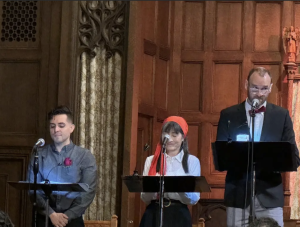Annotating Performance by Barbara Fuchs
Theatre dybbuk’s illuminated lecture format, which weaves together a scholarly lecture and performances by actors, recently offered me the opportunity to present Cervantes’ El retablo de las maravillas/The Marvelous Puppet Show to an audience unlikely ever to have encountered the text. Known for its deep dives and carefully considered productions under the able direction of Aaron Henne, theatre dybbuk uses the format as a research tool, and also makes the resulting recordings available through their podcast. Their most recent full production, The Merchant of Venice (Annotated) or In Sooth I Know Not Why I Am So Sad (2023), relied on a similar combination of text and commentary, with wonderfully inventive annotations offered by actors breaking the fourth wall, audio clips, and so forth.
While I respect the idea that productions should be entirely self-contained—no footnotes on stage!—the continuum stretching from illuminated lecture to annotated production offers a wealth of opportunities to introduce unfamiliar material. In this case, I wrote the broad outline of a lecture, making space within it for the actors to present the text. Aaron and I then worked closely on the pacing and segmenting, to ensure the audience would be able to follow both the lecture and Cervantes’ text. Because we were introducing an entremés (albeit a hefty one), we decided we would include most of the text. We were fortunate to secure authorization from Kathleen Jeffs to use her vibrant version of the text, translated with the Oxford University Playwriting and Dramaturgy Society. Aaron prepared a script that moved seamlessly from lecture to performance, including carefully selected callbacks to drive key points home.
The piece continued to evolve during our eight hours of rehearsal, as the brilliant cast—Joe Jordan, Adam Lebowitz-Lockard, Julie Lockhart, David Saldaña, Diana Tanaka, and Jonathan CK WIlliams—increasingly found the humor in their parts. Accustomed to a collaborative process, they also made their own suggestions for how to bring the text to life. As director, Aaron pushed the limits of the staged reading to include significant blocking as well as the necessary role changes. Live music, singing, and foley by Molly Pease added a key sonic component. We had a brief moment of panic (referenced in the lecture, which occasionally tended to the meta) about whether our audience would expect a puppet show, but quickly convinced ourselves that the discrepancy between advertising and reality was part of the point, and fully appropriate. After all, The Marvelous Puppet Show was Cervantes’ title.
The piece was recorded and should be available soon on theatre dybbuk’s podcast, The Dybbukast, which can be accessed wherever you listen to your podcasts. My hope is that this will be the first of many collaborations between theatre dybbuk and DTC, as we find new spaces and channels for diversifying the classical repertoire.
Photo courtesy of Flori Schutzer, theatre dybbuk




No Comments